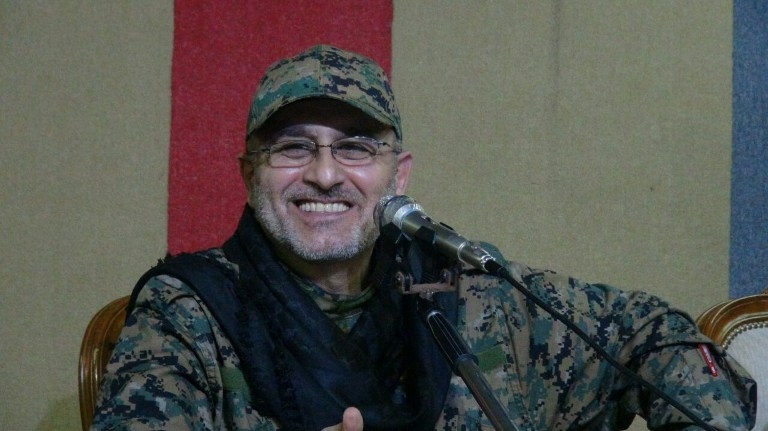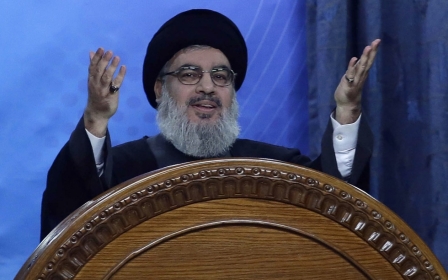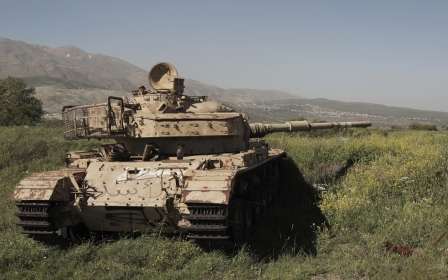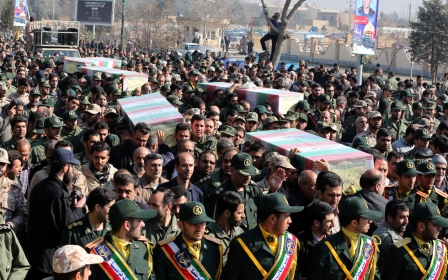Top Hezbollah military commander killed in Syria

Hezbollah on Friday announced the death of its military commander in Syria, Mustafa Badreddine.
"He said a few months ago, 'I will not come back from Syria, unless a martyr or carrying the flag of victory'. He is the top commander Mustafa Badreddine. And he came back today as a martyr," the Shia movement said in a statement carried by the Al-Manar TV channel.
Hezbollah, along with Iran, is battling on the side of Bashar al-Assad's government in Damascus - making the trio de facto allies on the ground.
Initial reports suggested Badreddine was killed by a covert Israeli operation, but Israeli media is reporting that the country was not responsible for the strike.
Israeli officials, who rarely confirm reports of this nature, have not responded to the earlier allegations.
Israeli news site Debkafile, known to be close to the country's intelligence apparatus, on Friday quoted Israeli military sources as saying that Badreddine had been killed by Syrian or Iranian forces amid a dispute over Badreddine's plan to withdraw large numbers of Hezbollah forces back to Lebanon as a result of large losses they were incurring in Syria.
Israel fears that the chaos in Syria could help strengthen arch-enemy Hezbollah, and Prime Minister Benjamin Netanyahu said in April that the army had attacked dozens of convoys transporting weapons to the group.
"Information received during a preliminary investigation shows that a large explosion targeting one of our posts near Damascus international airport killed Mustafa Badreddine and injured others," Hezbollah said in a separate statement.
Some have said that Badreddine assumed the position of Imad Moughniyeh, the former Hezbollah commander, and Badreddine's brother-in-law, who was killed in 2008 in an assassination in Damascus. Others say that he was only leading the group's Syria operations.
Moughniyeh's assassination prompted immediate threats by Hezbollah of a strong retaliation against Israel, which it blamed for the killing - but Badreddine's death has as yet provoked no such threats.
Badreddine was one of five figures from Hezbollah accused of the assassination of Rafic Hariri, a former prime minister of Lebanon.
In 2012, the US Treasury imposed sanctions on Badreddine along with a number of others in Hezbollah's leadership, for the movement's "active support to the regime of Syrian President Bashar (al-)Assad, as well as its role in terrorist activities".
Hezbollah is listed as a terrorist group by Washington.
The group has said it is still investigating the cause of the blast near Damascus airport, but it did not immediately point the finger at Israel as it did when the commander's predecessor was assassinated in the Syrian capital in 2008.
The death of Badreddine, who led Hezbollah's massive intervention in Syria in support of Assad, comes as a fragile truce in the country's five-year conflict teeters on the brink of collapse.
A six-day-old partial ceasefire in battleground second city Aleppo expired early Thursday without renewal and rebel sniper fire on the government-held sector of the city killed two civilians, one of them a woman, a monitoring group said.
Heavy air strikes pounded Al-Qaeda's Syrian affiliate Al-Nusra Front in its Idlib province stronghold in the northwest, killing 16 of its fighters, including a senior commander.
Badreddine had been a key player in Hezbollah's military wing virtually since its inception.
"Badreddine is assessed to be responsible for Hezbollah's military operations in Syria since 2011, including the movement of Hezbollah fighters from Lebanon to Syria, in support of the Syrian regime," the US Treasury Department said.
"Since 2012, Badreddine coordinated Hezbollah military activities in Syria," it said, adding that he liaised personally with Assad.
His funeral was to be held in Hezbollah's stronghold in the southern suburbs of Beirut at 5:30 pm (1430 GMT), the movement announced.
Key prop for Assad
Hezbollah's intervention was vital in shoring up Assad's regime at its lowest point in the war against rebels, who are backed by Gulf Arab and Western countries.
Its fighters secured most of the Lebanese border region, cutting vital rebel supply lines, and reasserted government control in most of the southern suburbs of Damascus, including the Sayyida Zeinab Shia shrine district, revered by Hezbollah's followers and by its Iranian backers.
The intervention of Moscow in September last year in support of its Damascus ally has sharply expanded the military coalition backing it.
Russian officials have, however, vowed to work closely with their US counterparts to salvage a February ceasefire between pro-government forces and rebels deemed "moderate," but it was on the brink on Friday after the collapse of the Aleppo truce.
That deal had sharply reduced a surge in the fighting in Syria's pre-war commercial capital that had killed more than 300 civilians.
Al-Qaeda, like the Islamic State group that controls much of eastern Syria, was never party to the truce, and more than 60 air strikes on Thursday targeted the Nusra-controlled Abu Duhur airbase in an area of Idlib province, the Britain-based Syrian Observatory for Human Rights monitoring group said.
It was unclear whether those strikes were carried out by the Syrian air force, Russian warplanes or aircraft of the US-led coalition, all of which have struck Al-Qaeda in Syria in the past.
Al-Qaeda fighters and their allies shot dead 19 civilians from Assad's Alawite minority in their own homes after seizing their village in central Syria on Thursday, the Observatory said.
The Alawites - followers of an offshoot of Shia Islam who are mainly concentrated in the Mediterranean coastal provinces of Latakia and Tartus - are despised as heretics by militants from groups like al-Qaeda.
Middle East Eye propose une couverture et une analyse indépendantes et incomparables du Moyen-Orient, de l’Afrique du Nord et d’autres régions du monde. Pour en savoir plus sur la reprise de ce contenu et les frais qui s’appliquent, veuillez remplir ce formulaire [en anglais]. Pour en savoir plus sur MEE, cliquez ici [en anglais].




